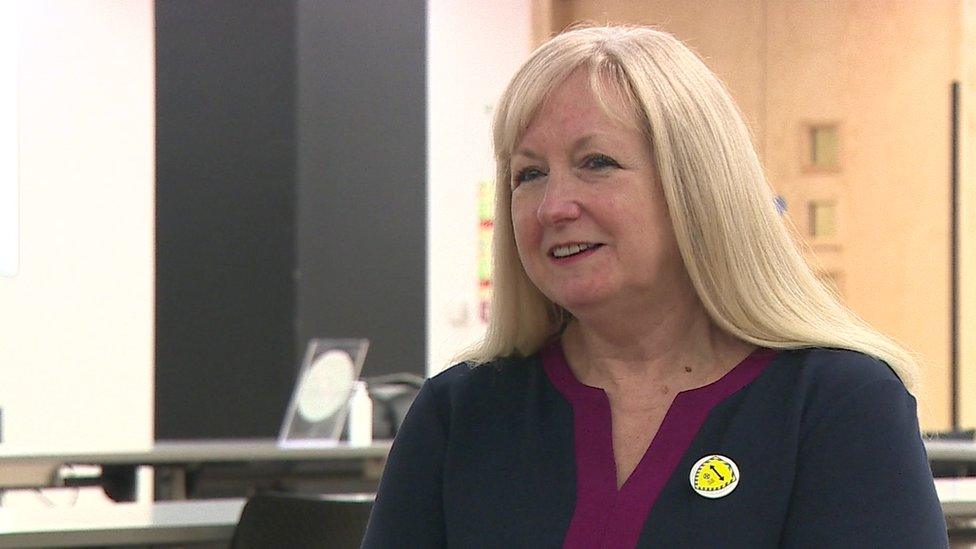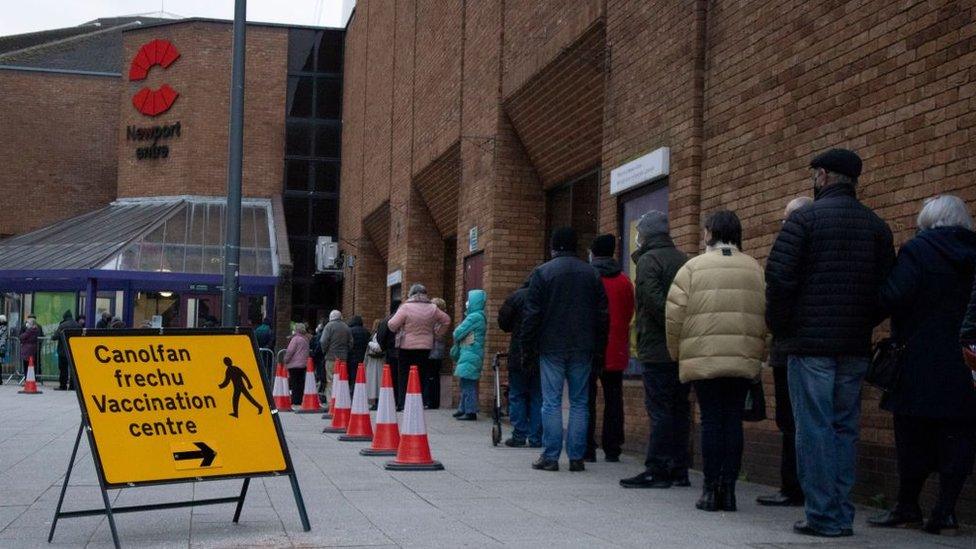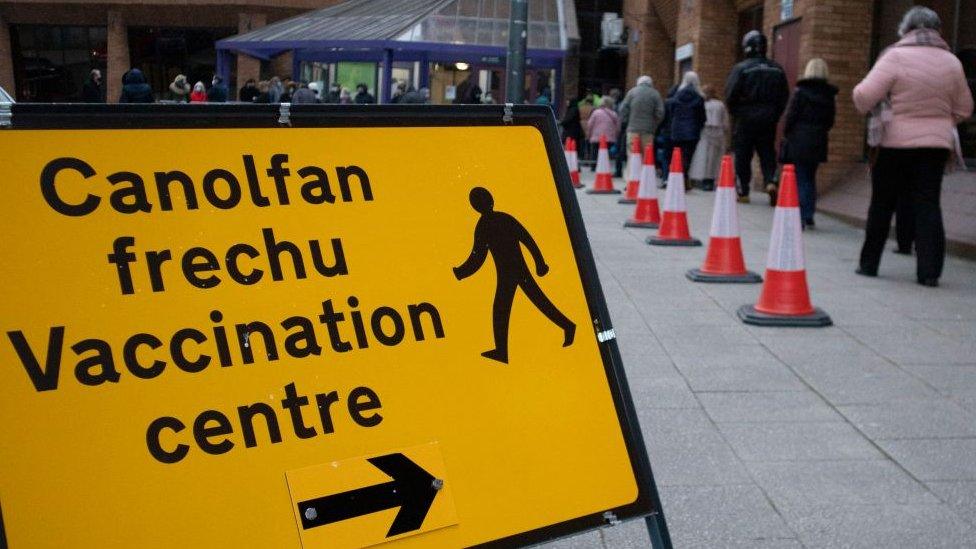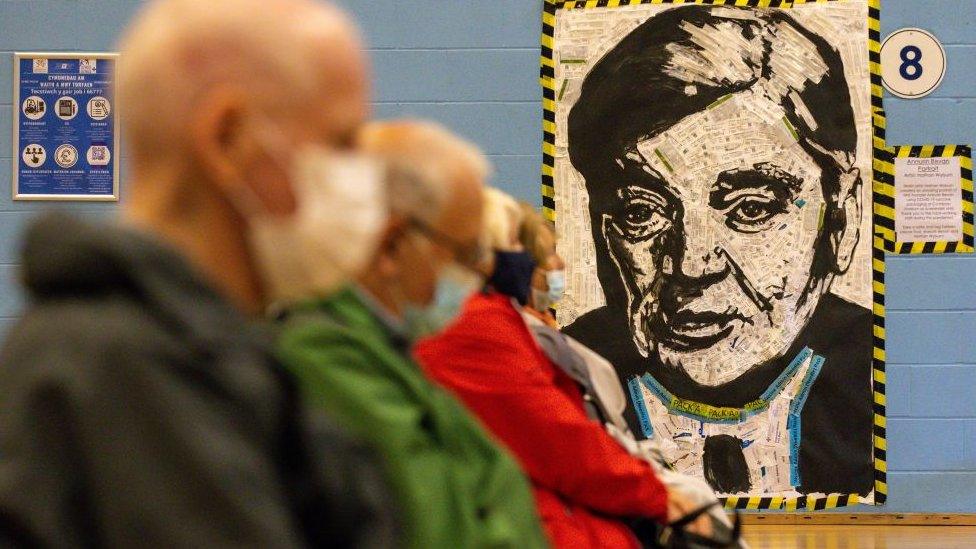Covid: Vaccine roll out rate can now 'fly' in Wales
- Published
- comments
Vaughan Gething says appointments are now being given to people aged 65-69 and some other groups
The roll out of the Covid-19 vaccine can now "fly", the doctor in charge of Wales' programme has said.
Dr Gill Richardson added ongoing studies were looking at whether the immunisations would become regular and routine, similar to the flu jab.
It comes as figures show one in four people in Wales has received a vaccine.
Dr Richardson said vaccine supply would increase in March and, by April, there would be "levels of supply that we haven't hitherto seen".
"We will have more than enough vaccines to give the first doses to all of those who require it," she said.
Dr Richardson added that the infrastructure put in place to immunise the population took "slightly longer to build" but now that it's in place the process could "fly".
"You've seen how incredible the NHS efforts have been in delivering that vaccine and we have nowhere near maximized our capacity to immunise," she said.
"We would have wanted that Oxford-AstraZeneca in every general practice and every pharmacy in the land that would like to give it and the supply has constrained that ability, but we will be rolling out to more and more in that sector."

Dr Gill Richardson says the roll out of the vaccine can now "fly"
It is expected the Moderna vaccine, the third Covid vaccine approved in the UK, will bolster vaccination supplies later in the year.
In the meantime, the number of vaccines supplied to Wales is expected to fall over the next fortnight, affecting some of the country's vaccination centres.
Dr Richardson also said several studies were looking at what immunisations may be needed in future.
"It could be that it's just certain clinical risk factors or age factors that will mean that those people have to have it.
"Ever since we started this program we've always had an eye for what is the sustainability route for this course of immunity."
Are death rates falling when people have been vaccinated?
Dr Richardson said it was difficult to establish the full impact of the vaccination programme while the country was in lockdown, but suggested early signs were positive.
"On a UK basis, it looks like the death rate for those in the vaccinated cohorts is decreasing which is really encouraging news. The rate of deceleration is faster than the rate of deceleration for those in younger groups, so that's a really good sign."
But she stressed that lockdown rules must be adhered to in the meantime as there was uncertainty whether the vaccine interrupts transmission.
Leading statistician Prof Jennifer Rogers said there was a sharper drop in deaths of those aged 90 and over compared with those aged 50 to 59, who had not been vaccinated.
"It definitely suggests that it is not an anomaly," she told BBC Radio Wales.

Prof Jennifer Rogers is a member of the Covid-19 Task Force at the Royal Statistical Society
First Minister Mark Drakeford said on Sunday that everyone aged 50 and over will receive a first dose by the end of April.
Those aged 80 and over were in the groups that were the top priority to get vaccinated first.
Prof Rogers, who is a member of the Royal Statistical Society, said older people "make up 10% of cases but 80% of deaths".
Across England, she said there had been a 35% reduction each week, external for the past fortnight in the number of deaths among people aged 90 and over, compared with a 22% drop among people aged 50 to 59.
In Wales, a total of 784,809 people have been given their first dose of vaccine, according to the latest figures, which is 24.9% of the population.
The over-70s, care home residents and staff, health and social care workers, and the clinically extremely vulnerable have already been offered the jab.
There is a similar prioritisation of vaccine rollout in England, where Boris Johnson has said he would set out a roadmap next week providing a "route to normality" to move England out of lockdown.
Health Minister Vaughan Gething said Wales' reduction in Covid-19 transmission showed lockdown had worked.
But, he told a press conference on Monday, it was "harder to tell" what impact the early stages of the vaccine roll-out was having on case rate numbers.
He said vaccines "will help to protect people when there is some more mixing".
'Emotional rollercoaster'

More than 770,000 people have been vaccinated in Wales
An updated roadmap out of lockdown in Wales is due to be published by the Welsh Government on Friday.
On Sunday, Mr Drakeford said the government will prioritise the return of three-to-seven year olds to school, along with some older children on vocational courses.
Ministers have started "cautious" talks about Wales' tourist industry reopening in time for Easter.
People in Wales largely support remaining in lockdown for longer if it means avoiding the "emotional rollercoaster" of going in and out of tighter restrictions, according to an academic.
Simon Williams, senior lecturer at Swansea University's school of management, told BBC Radio Wales people were not "overly optimistic" of restrictions easing significantly because they had been "burned in the past."

Dr Simon Williams says people in Wales are "remarkably willing to stick in lockdown as long as it takes"
Mr Williams said surveys from Public Health Wales (PHW) suggested as many as a quarter of people would be willing to stick to tighter restrictions for up to a year if it meant greater freedoms afterwards.
"So people are remarkably willing to stick in lockdown as long as it takes."
Asked about a vaccine passport, of those people who had received the vaccine, Mr Williams said he believed "the vast majority" would be comfortable carrying "proof of immunity".
He added it was "inevitable" for a vaccine passports to play a role in international travel in the future.
'Negligible' vaccine scepticism

The proportion of people who have so far refused the vaccine is "negligible", says Dr Giri Shankar, of Public Health Wales
The proportion of people who have so far refused the vaccine is "negligible" and a "very, very small proportion", according to Dr Giri Shankar, PHW incident director for Covid-19.
He told Radio Wales the first dose is "offering a level of protection" and that "all indications are suggestive of an improving picture", but added it was important people received their second dose when called upon.
Fielding questions from listeners, Dr Shankar urged people who had previously been ill with Covid-19 to accept the vaccine.
If people who are in the top four priority groups had not been contacted about a vaccine, Dr Shankar said they should contact their local health board.
All information is available on a dedicated Welsh Government website, external, he added.
- Published12 February 2021

- Published14 February 2021

- Published4 July 2022
